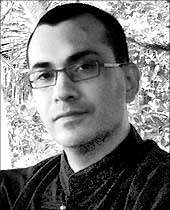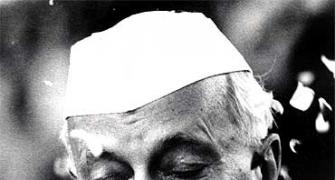 Sudeep Chakravarti's Avenue of Kings is an angry book. On the surface, this sequel to his first novel Tin Fish might read like an adult's juvenile rant. But beneath the surface, the book is a rare instant of a book living up to the jacket blurb: 'Sudeep's India is the real India'.
Sudeep Chakravarti's Avenue of Kings is an angry book. On the surface, this sequel to his first novel Tin Fish might read like an adult's juvenile rant. But beneath the surface, the book is a rare instant of a book living up to the jacket blurb: 'Sudeep's India is the real India'. So, over a decade when protagonist Brandy Ray's life takes significant turns, around him is the buoyant post-Indira Gandhi India. And, though the three novellas in the book are set between 1984 and 1992, the book is surprisingly not dated and is more true about the present day India than probably the time it is set in.
Chakravarti, who was a full-time journalist for more than two decades before going freelance and concentrating on book writing, is also among the country's top authorities in Left-wing extremism. His Red Sun: Travels in Naxalite Country is essential reading for anyone interested in understanding the Maoist conflict.
In this e-mail interview with Krishnakumar Padmanabhan, Chakravarti compares the India of today with Rajiv Gandhi's India, and talks of issues of the day like corruption and the direction the Maoist conflict will take in the coming months.
Avenue of Kings deals with a decade from 1984 to 1992. Does it take that long to look back and make sense when fiction is set against real events?
I believe that both non-fiction and fiction can make sense of real events not too long after these events. But there is usually a revisiting for crucial events -- fulcrum events. We in India frequently revisit the Partition, for example. The US revisits Vietnam, and later, 9/11 -- and shall soon revisit Iraq and Afghanistan. Britain, Germany and Japan haven't got over World War II.
But in India, while fiction in several Indian languages has regularly looked back at key events, Indian writing in English has for long focused on colonial issues, diasporic writing, exotica -- inter-racial lovemaking under a jacaranda tree, as it were -- and a certain pandering to the United Kingdom and the United States markets. Writing according to the 'other's' image of India has largely driven writing. This is changing. I am delighted to be part of this change: Stories are being written because stories need to be told.
As for The Avenue of Kings, the 'making sense' has happened now for a less dramatic reason. I was caught in a full-time media career for nearly two decades, and simply did not have the mind space to pursue literary writing.
As to the period the book is set in, I firmly believe not enough has been written from a literary perspective. The revisiting, the introspection, must continue. There has been no closure, merely an expedient sweeping under the carpet of truths and dynamics that continue to shape and shake India till today. Until you acknowledge and accept, how can you have closure?
There has not been much in terms of real justice, be it the Sikh massacre or the Bhopal gas tragedy. What role does fiction play in keeping such events in public conscience?
I agree entirely. Justice is lacking; justice has been politicised and warped to protect the political and administrative leadership of the time. In India, unfortunately, justice is not a Constitutional right, often it is a political embarrassment.
Through the simple yet effective art of storytelling, fiction helps to distil such events and injustices; make the horrors every day horrors; it absorbs the poignancy, the pain, the confusion -- even the apathy -- of a people, of a nation. Fiction helps to relate it to people without the jargon that non-fiction can sometimes fall prey to, and without the obfuscation that spin-doctors of the day apply to media.
Storytelling has remained an effective conscience from the birth of storytelling. There needs to be a remembering, there needs to be respect, there needs to be an abiding sense of humanity -- fiction, storytelling, helps to provide us these things when justice does not.
As an extension, is 1984 the worst year in our modern history? If so, are there any particular reasons for it to have turned that way?
In India, it is difficult to gauge the worst day in our modern history -- there have been so many!
As to the events of 1984: Such stupidity, such obtuseness, such politics, such hatred.
I ask myself sometimes: why would you need Mohandas Gandhi in a place of peace? A man of peace is needed only in a place of hatred, suspicion and rot. Others have said it in many ways before, and I will in all humility say it again: our politicians and those who are in positions of power use and abuse citizens; and we are all complicit in permitting it to happen. That is how 1984 came about.
It was such a tragic display of manipulation and reaction. The desecration of a State; the deliberate birthing of a merchant of hate; the desecration a great symbol of religion; the killing of a prime minister; and the slaughter of thousands of innocent adults and youngsters; more violence and tragedy through insurrection and its handling. To what end? To keep a lady and her family in power? It set India back by years.
And we haven't learnt those lessons well. Our media is full of it every day.
 Though the book is very good, isn't the coming of age novel, as a genre, overdone these days?
Though the book is very good, isn't the coming of age novel, as a genre, overdone these days?
The Avenue of Kings is a sequel to my debut novel, Tin Fish. In that, the protagonist and narrator, Brandy Ray, is a 15-year-old boy. In the course of the three novellas that make The Avenue of Kings, Brandy Ray's age is progressively 21, 24 and 28 years. I would hardly call it 'coming of age'.
In the third book of the trilogy that I plan, Brandy Ray could well be in his mid-30s or 40s. Would it then also count as a 'coming of age' book?
I think the phrase 'coming of age' is an abomination visited upon writers by glib publishers and lazy critics. What is important is the story and the way it is told. If there is a connect with the reader, then the story will have achieved its purpose -- genres be damned.
Brandy Ray's journey mirrors the journey of modern India. Their relationship is organic. I would let it rest there.
The protagonist seems to have a soft corner for Rajiv Gandhi? Why is it so?
Rajiv Gandhi was a compelling idea for a young person at the time. It was a time of some hope that here was a young man, relatively unblemished, who might take India away from the path of mayhem and cynicism. This is a reality: we need to remember that Rajiv Gandhi won a landslide electoral victory.
But what you call a 'soft corner' has complex overtones in The Avenue of Kings. The second novella in the book, The Cradle of Innocents, is placed in the aftermath of the death of the Rajiv Dream. The mood of the times is in a way mirrored in the dreams and relationship of Brandy Ray and Suya -- Anasuya, his girlfriend and eventually, spouse.
The upturns and downturns of the times are in parallel tracked with their story of hope, love and betrayal. In so many ways, that was the story of Rajiv Gandhi and the times he lived in as prime minister. I think urban India again learnt to dream in those heady years of aspiration, even as for so many it turned rapidly to despair, with the exposure of cronyism, abundant sycophancy, abundant corruption, delirious policymaking, and childish misadventures in foreign affairs.
Do you see parallels between Rajiv's government and the current one, in terms of how they both seem to have thrown away the advantage of a majority thanks to corruption?
Absolutely. The stakes are higher now, that's all. No amount of spin-doctoring will alter the reality of what I might venture to term the United Regressive Alliance.
What is different between these two governments?
Rajiv Gandhi's government lived on the arrogance of absolute majority and the blindness of naïveté. The current government lives on the arrogance of coalition and the blindness of dynasty.
How do you see Binayak Sen's conviction for sedition? What is its significance in the times we live in?
Binayak Sen's conviction by a local court in Raipur is an abdication of democracy. It is the result of an act of vengeance by the local government as Sen exposed its corruption and brutality. As activism and Right to Information exposes more cronyism and corruption, hits more where the money is, such revenge and 'conviction' will become more common. However, I believe one day soon there will be a reckoning, and India shall have to pay a very heavy price.
How do you see the subsequent filing of sedition charges against activist Sudhir Dhawale? Do you see other state governments emboldened by and using Sen's conviction as a precedent?
State governments have for long used provisions of law to harass, arrest and silence their critics. This precedes Binayak Sen's arrest in 2007 and his recent conviction. This practice is prevalent throughout India -- not just in states affected by the Maoist rebellion, or what is called north-east India.
It's been just over a year since the Centre escalated security operations against Maoists. How would you review this period? Has the government succeeded?
The government has succeeded to the extent that several Maoist leaders have been apprehended and some killed. But the government has failed -- and it will continue to fail -- as it does not care to eradicate the root causes of rebellion, which are non-governance, bad governance, lack of effective judicial delivery systems, and outright corruption. Rebellion will not disappear even if the current cycle of Maoist rebellion is brought to an end. There will be other cycles -- as has been proven several times over since the outbreak of peasant rebellion in Naxalbari in 1967 -- until governance, justice and development are delivered instead of corruption and inefficiency.
The Maoists have lost a lot of their politburo and central committee members in the last 18 months. How will it affect their movement?
Certainly it will affect the movement. No movement can remain unaffected with the kind of hits the Maoist rebellion -- Communist Party of India-Maoist and other factions -- have taken in the past two years. This cycle of extreme left-wing rebellion had not been pushed to the wall like it has now.
But I expect the rebellion to reach out to more recruits in both rural and urban areas, consolidate their areas of operation, spread propaganda and recruitment drives into new areas, and train and develop levels of leadership. I expect Maoists to also become in some ways more elusive, as they attempt to counter intelligence and operational penetration of their ranks and leadership by security agencies. The rebellion will in the immediate future become more 'guerilla', not less.
How will this year be in the battle between the state and the Maoists? Will it get bloodier, or is there a chance of both sides taking the foot off the accelerator to sit for talks?
I will be quite surprised if any formal talks take place in the coming year. Talks typically take place in a no-win or stalemate situation for one party or the other. I don't think we have as yet arrived at that point. As to things getting 'bloodier', there is always the chance of spectacular confrontations and operational victories by one side or the other. But I believe both sides are now being more deliberate, more cautious -- confrontation will not take place unless there is a good chance of success; or there is a great need to prove a tactical or strategic point.
What I fear will get far more intense and, even, bloodier, is the level of domination of common folk in the jungles and rural areas, where innocents come in the way of war between Maoists and the State, on the one hand; and the compact of various government and business interests to aggressively acquire land for mining, metals, and manufacturing projects, on the other. This is happening right now. It is tragic, and will bring untold socio-political grief.
Images: (top) Naxals cadres in Chandrapur, Maharashtra (inset) cover of Avenue of Kings. Below: Sudeep Chakravarti
The Avenue of Kings will be released in Mumbai at the Kala Ghoda Festival of Arts & Literature, February 5









